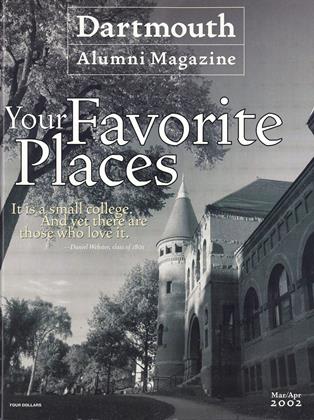If early admissions disappear, applying to college will be more stressful than ever.
Each year Dartmouth undertakes the important task of selecting its new class of incoming students. We do this through an early admission cycle, with an application deadline of November i and notification during December, and a regular admission cycle, with an application deadline of January 1 and notification during April. As many readers are no doubt aware, early admission systems have generated national debate in recent months. While we continually assess our admissions programs, at the present time we are committed to continuing early admissions.
Dartmouth initiated early admissions in 1958 as a means of allowing exceptionally qualified high school students to apply to the College early. In applying early, applicants indicate that Dartmouth is their first choice and agree to withdraw applications to other institutions if admitted by Dartmouth. While some aspects of the system have changed since those early days, two essential questions still surround and guide our approach to early admissions: Does the system benefit the College, and is it fair to students?
Today most selective institutions use some form of early decision or early action (under which admitted students are not committed to attend). Dartmouth admits approximately one-third of its class through early admissions. Through this system those students who really want to attend a particular institution have the opportunity of expressing that preference and of completing the admissions process early. For institutions, the early-decision process allows for the selection of attractive, committed candidates ahead of the regular schedule and gives a head start on identifying the following year's class.
There is no doubt that the admissions process has become much more commercialized and stressful than it was in the 19505. I wish that we could reduce that stress, but I do not think that the elimination of early admissions is the way to do that. Indeed, such an action might even increase the pressure on young people. Students would need to wait until later in their senior year of high school to find out where they will be going to college. This delay would encourage more applications to more schools as students tried to maximize their options, which, in turn, could lead to a further proliferation of commercial test preparation and admissions counseling.
Competition to get into the most selective schools is certainly intense, and students and their parents look for the competitive edge wherever they can find it. Some critics suggest that early decision provides just such an edge because, they claim, the chances of admission are higher. In fact, the rate of admission (the percentage of students admitted) for early admission is higher than the rate for regular admission, but a weak candidate does not stand a better chance in early decision than in regular admission. Dartmouth's standards for admission remain the same in the early and regular processes. We do not accept at early decision students whom we would not accept in April.
Students who apply for early admission have chosen Dartmouth as their topchoice school. These students tend to be academically talented, and some are recruited athletes or students with some special tie (such as a legacy) to the institution. Thus, they are strong candidates for admission, and Dartmouth would be interested in them regardless of when they applied.
But the early admission system is not for everyone. It is not an appropriate avenue for students who have no clear first choice of college. Such students deserve and need more time to make up their minds on this extremely important decision.
Some students who need financial aid also worry about whether they should apply early. Dartmouth is one of the few institutions that is completely need-blind in its admissions process and has an extremely generous system of financial aid that covers students' needs during all four undergraduate years. Over the last several years Dartmouth has added more than $3 million to its scholarship program and substantially reduced student loan expectations. Students admitted through early decision are provided with the same financial aid they would qualify for in regular decision.
At Dartmouth we work hard to ensure equity in the admissions process. Our admissions officers conduct many information and financial-aid counseling sessions each summer and fall so that students from a wide variety of backgrounds will be in a position to realistically consider an early application. Nonetheless, some students decide to apply to a number of schools and to compare financialaid packages.
Dartmouth uses its early decision program in a thoughtful, responsible and judicious way, balancing the needs of the institution with the well-being of students. This year Dartmouth once again admitted a wonderfully talented group of students through early decision. The candidate pool for the regular admission cycle also looks promising, and I am fully confident that the class of 2006 will rank among the strongest to be found anywhere.
 View Full Issue
View Full Issue
More From This Issue
-
 Cover Story
Cover StoryFavorite Places
March | April 2002 -
 CLASSROOM
CLASSROOMFrom the Page to the Stage
March | April 2002 By Karen Endicott -
 SEEN AND HEARD
SEEN AND HEARDNewsmakers
March | April 2002 -
 PERSONAL HISTORY
PERSONAL HISTORYMeasure of the Mind
March | April 2002 By Robbing Barstow ’41 -
 Class Notes
Class Notes1980
March | April 2002 By Wade Herring, Carol Willard -
 Class Notes
Class Notes1987
March | April 2002 By Jonathan Silverman
President James Wright
-
 Article
ArticleWhere Do We Go From Here?
JANUARY 2000 By President James Wright -
 Article
ArticleThe Price of Excellence
MAY 2000 By President James Wright -
 Article
ArticleAt Home On Campus
Nov/Dec 2000 By President James Wright -
 Article
ArticleThe Global College
Jan/Feb 2001 By President James Wright -
 Article
ArticleExpanding Dartmouth
May/June 2001 By President James Wright -
 Article
ArticleDollars and Sense
July/August 2001 By President James Wright








